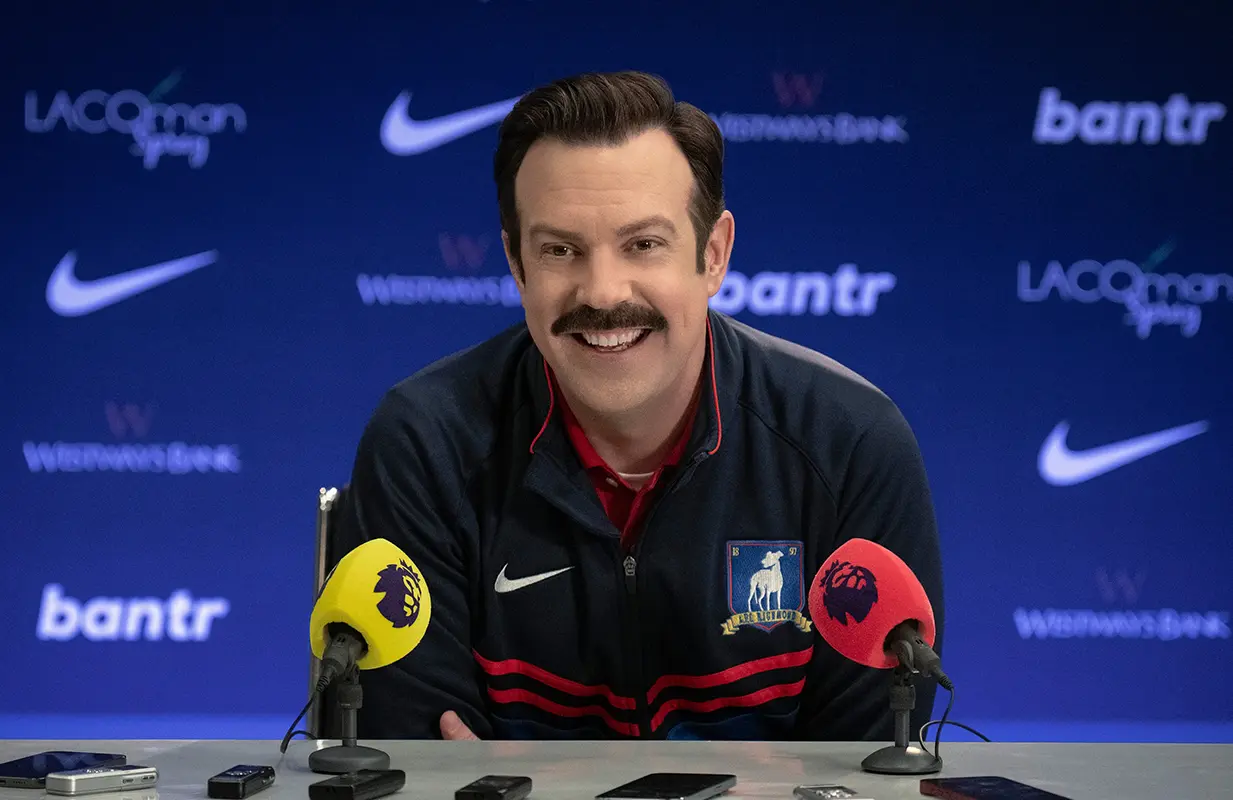Ted Lasso's Relentless Optimism Becomes a Black Hole in Season 3
-
 Jason Sudeikis in Ted Lasso Season 3 (Photo: Apple TV+)
Jason Sudeikis in Ted Lasso Season 3 (Photo: Apple TV+)Perhaps the world has gotten more cynical since Ted Lasso last aired in 2021, but in Season 3, Ted’s (Jason Sudeikis) relentless optimism just doesn’t hit the same way. While the Emmy-winning comedy’s second season offered a window into Ted’s inner turmoil and the origin of his “kill ’em with kindness” worldview, the latest outing makes for a disappointing reversal. Rather than continuing to examine the dark underbelly of Ted’s empathy and cheeriness, Season 3 backtracks, doubling down on the warm-and-fuzzies that viewers have come to expect (and in some cases, demand) from the show, to the exclusion of all else.
This isn’t immediately obvious, since the opening scenes of the season premiere nod to the possibility of conflict: Though Sudeikis’ character enters on a high, having successfully led AFC Richmond back to the Premier League after a one-year stint in an inferior division, he also grieves after sending his young son back across the ocean to his mother. Meanwhile, practically every news outlet has predicted the Greyhounds will finish last in the 20-team league — a fact that doesn’t surprise Nate (Nick Mohammed), whose heel turn became complete when he joined rival squad West Ham United. He repeatedly jokes that the only reason Richmond is expected to come in 20th is because there’s no 21st place.
The vote of non-confidence worries Rebecca (Hannah Waddingham), who’s determined to defeat her ex-husband Rupert (Anthony Head) now that he owns West Ham, but Ted, who shakes off his family troubles when he’s at the office, remains unbothered. True to form, he would rather playfully correct her grammar and offer pop culture asides than actually engage with the substance of her argument.
Back-and-forths like these have always powered the show — Episode 2, “(I Don’t Want to Go to) Chelsea,” features an extended scene in which Ted and the players repeatedly misunderstand each other, only to end up back where they started — but after three seasons, the magic has drained out of them. When well-meaning interruptions are a cornerstone of a character’s identity, viewers may realize just how much that character is disrupting the flow of the story.
The other characters might realize it, too, which could lead to some authentic and merited disagreements. But in the first four episodes made available for review, showrunner and co-creator Bill Lawrence barely gives Ted’s colleagues a moment to question the Ted Lasso Way. All it takes for Rebecca to realize the value of “letting Ted be Ted” is a few self-deprecating one-liners at a press conference; Coach Beard (Brendan Hunt) and Roy (Brett Goldstein) ignore their boss’s positive-vibes-only motivational advice, and then watch as their strategy backfires in a high-stakes game. Implicit in these scenarios is the suggestion that there’s a right way (as in, Ted’s way) to do things, and a wrong way, but the comedy never stops to consider that there might be another viable option somewhere in the middle.
This, of course, isn’t so different from the Ted Lasso of years past. (Season 2 may have dug deep into Ted’s anxiety, but it never doubted the validity of his methods.) But after three seasons, Ted’s kindness — the very thing that drew many viewers to the comfort comedy in the first place — has become an unintentional narrative obstacle: His worldview is so firmly rooted that there’s little room for growth. And by implying Ted’s is the best (and only) way, the show suggests its protagonist doesn’t need to grow, which both rings untrue and contradicts the season’s attempt to characterize him as a “work in prog-mess.”
Ted’s black hole of positivity detracts from interesting things the season attempts elsewhere, particularly Keeley’s (Juno Temple) struggle to manage her new PR agency. Like Ted, Keeley has always believed things will work out alright in the end, but her new responsibilities force her to reckon with the limitations of this mentality. Fueled by her combative relationship with her no-nonsense CFO Barbara (Katy Wix), the storyline brings Ted’s approach into the outside world, where it proves to be far less successful (though seeds planted in the first four episodes suggest it will ultimately triumph over Barbara’s more disciplined attitude).
The season also offers more romantic intrigue, not only in the Keeley, Roy, and Jamie (Phil Dunster) love triangle that was established last season, but also with supporting players like Colin (Billy Harris). Colin’s new romance risks falling back on tropes, though it’s handled with more sensitivity than Rebecca and Sam’s (Toheeb Jimoh) relationship. And speaking of the boss and her player: They renew their will-they/won’t-they dance, and just like last season, the series ignores the potentially destructive power imbalance. As the Rebecca-Sam blindspot grows, it becomes harder to reconcile this storyline with a series that purports to challenge toxic masculinity, as seen through Nate’s continued arc.
Still, the comedy is most alive in the stories unfurling beyond Ted’s scope of influence. This, in and of itself, feels like proof positive that Ted Lasso has run its course. The creative team has yet to confirm that Season 3 is the show’s last — though Sudeikis has hinted at it, saying, “This is the end of this story that we wanted to tell” — but so long as Ted remains trapped in his gilded cage of optimism, there’s nowhere left to fly.
Ted Lasso Season 3 premieres March 15 on Apple TV+, with new episodes dropping every Wednesday through May 31. Join the discussion about the show in our forums.
Claire Spellberg Lustig is the Senior Editor at Primetimer and a scholar of The View. Follow her on Twitter at @c_spellberg.
TOPICS: Ted Lasso, Apple TV+, Anthony Head, Bill Lawrence, Brendan Hunt, Brett Goldstein, Hannah Waddingham, Jason Sudeikis, Juno Temple, Phil Dunster, Toheeb Jimoh